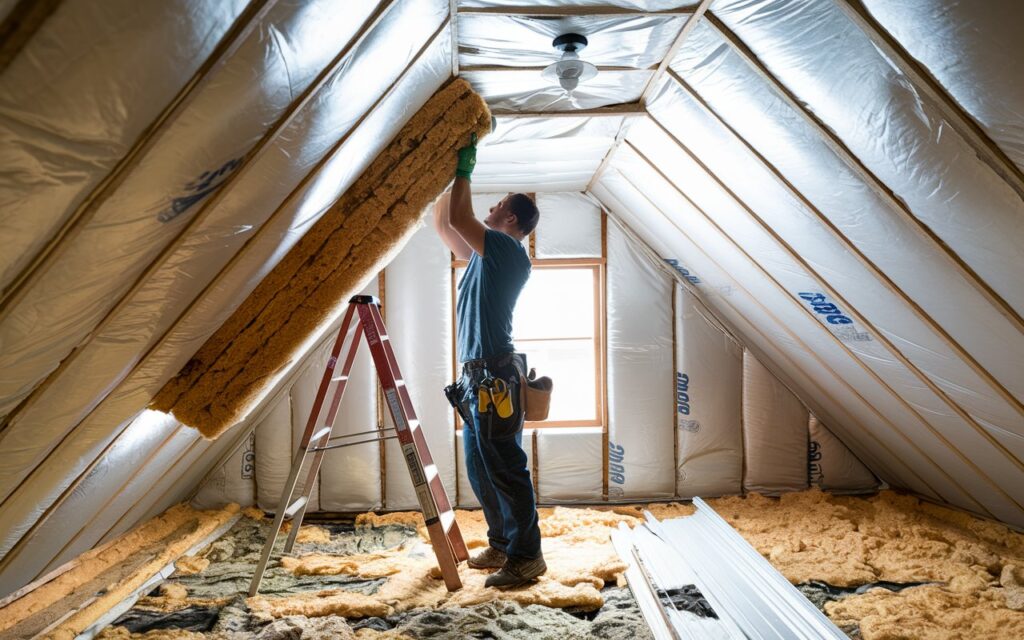Colorado’s climate is as diverse as its landscape, ranging from snowy mountain towns to sun-soaked plains. With this variety comes a unique challenge for homeowners: maintaining a comfortable indoor temperature year-round while keeping energy costs under control. One of the most effective ways to achieve this balance is through proper insulation.
Why Insulation Matters in Colorado
Insulation acts as a barrier, slowing the transfer of heat between the inside of your home and the outdoors. In Colorado, this means keeping warm air inside during chilly winters and blocking heat from entering during hot summers. Attic insulation, in particular, plays a crucial role because heat naturally rises, making the attic a key area for preventing energy loss. Homes with inadequate insulation, especially in the attic, can experience drafts, uneven temperatures, and higher energy bills as heating and cooling systems work overtime.
Beyond comfort, proper insulation also contributes to the longevity of your HVAC system. When your furnace or air conditioner does not have to work as hard to maintain a steady temperature, it experiences less wear and tear, reducing maintenance costs and extending its lifespan. Ensuring your attic is properly insulated is one of the most effective ways to maximize energy efficiency and protect your home from temperature extremes.
Types of Insulation Commonly Used in Colorado
There are several insulation options that work well in Colorado’s unique climate:
- Fiberglass Insulation – A popular choice for walls and attics, fiberglass is cost-effective and provides excellent thermal resistance. It’s available in batts, rolls, and loose-fill forms for different installation needs.
- Spray Foam Insulation – Ideal for sealing gaps and hard-to-reach areas, spray foam expands to fill cracks and crevices, providing superior air sealing and energy efficiency.
- Blown-In Cellulose – Made from recycled materials, cellulose insulation is an eco-friendly option that can be installed in attics and wall cavities for improved thermal performance.
- Rigid Foam Boards – Often used for basements or exterior walls, these boards provide high insulating value and can also act as a moisture barrier.
Selecting the right type of insulation depends on your home’s age, structure, and energy goals. A professional assessment can help determine the most effective solution for your specific situation.
Benefits of Upgrading Your Insulation
Investing in insulation isn’t just about comfort; it has tangible benefits that impact your wallet and the environment. Some key advantages include:
- Lower Energy Bills – Proper insulation reduces heat loss in the winter and heat gain in the summer, leading to significant savings on heating and cooling costs.
- Improved Indoor Comfort – No more cold spots in winter or hot rooms in summer—insulation helps maintain a consistent temperature throughout your home.
- Noise Reduction – Certain types of insulation, such as spray foam or fiberglass, also act as sound barriers, reducing noise from traffic, neighbors, or other sources.
- Increased Home Value – Energy efficiency is a selling point for many buyers. Well-insulated homes often rank higher in appraisals and attract more interest on the market.
Tips for Maintaining Insulation in Colorado
Even the best insulation can lose effectiveness over time. To ensure your home stays energy-efficient:
- Inspect your attic and walls for gaps, cracks, or compressed insulation.
- Seal any air leaks around windows, doors, and vents.
- Consider adding more insulation if your home is older or has undergone renovations.
- Work with a professional who understands Colorado’s climate and building codes to ensure proper installation.
Trust the Experts
Proper insulation is an investment in comfort, energy efficiency, and long-term savings. For homeowners in the Denver area looking to upgrade or install insulation, working with a trusted professional is essential. A Denver insulation expert can assess your home, recommend the best insulation type, and install it correctly to maximize benefits.
Take the first step toward a more comfortable and energy-efficient home—contact a Denver insulation expert today to schedule an assessment and learn how you can improve your home’s insulation.

